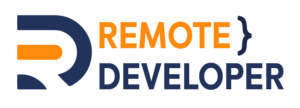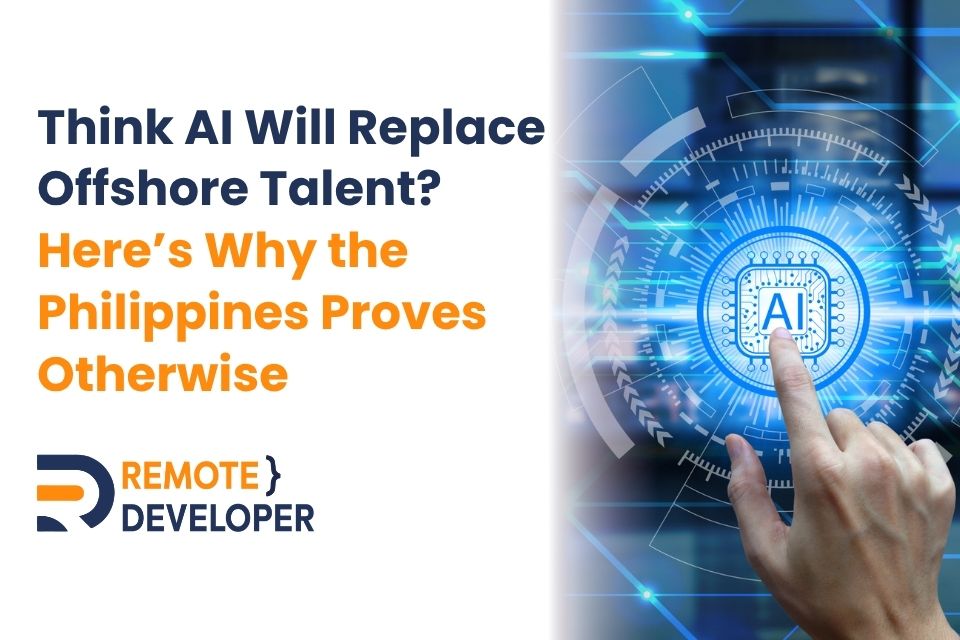You’ve probably heard people say AI is going to take over everything. It’s impressive how it can analyse data in a flash, handle boring tasks, and even assist in coding. Sounds amazing, right? But the truth is AI can’t do everything. In offshore development, teams still require real people who can handle complexity and cultural nuances.
The Philippines has long been a leading destination for outsourcing and remote tech work. Filipino developers offer technical skills, strong English communication, and a collaborative attitude that machines cannot replicate. In this blog, we discuss why AI is still a tool and not a replacement, and why the Philippines remains a standout hub for offshore talent.
What AI Can & Can’t Do
AI has come a long way in helping with everyday tasks. It speeds things up, handles massive datasets, automates routine work, and more. But it still can’t match the deeper understanding, local knowledge, and human touch that people bring to the table.
What AI Can Do:
- Analyse large datasets faster than humans
- Automate repetitive and rule-based tasks
- Generate templated content and responses
- Assist with coding, debugging, and documentation
- Translate languages and summarise text
What AI Can’t Do:
- Understand complex cultural context or local nuance
- Provide genuine empathy in customer interactions
- Handle tasks that require critical thinking or human judgment
- Make ethical decisions in ambiguous situations
- Innovate or create with original thought and emotional depth
So while AI is incredibly helpful, it’s not designed to replicate everything that humans do. Instead, it works best when paired with skilled professionals who know how to use it wisely.
Strengths of Offshore Talent in the Philippines
Filipino professionals offer a remarkable mix of skills and attitudes that make them essential members of global teams. Their commitment and flexibility turn them into reliable partners for achieving long-term success.

1. Strong English Proficiency
Most Filipino professionals are fluent in English, which makes communication seamless and helps avoid misunderstandings. They can create clear documentation, take part in meetings, and connect with international clients without significant accent issues. This fluency not only speeds up project timelines but also strengthens team unity, reducing the chances of errors stemming from miscommunication.
2. Cultural Compatibility
With a rich history of collaboration with Western companies, Filipinos have a solid grasp of global business practices. Filipino developers know how to present their ideas with respect and thrive in diverse teams. They quickly adapt to various corporate cultures and time zones, making collaboration feel effortless rather than forced.
3. Problem-Solving Mindset
Offshore teams in the Philippines are trained to address challenges proactively instead of waiting for directions. They ask insightful questions, suggest alternative solutions, and foresee potential obstacles. This proactive approach keeps projects on track and minimizes unexpected costs, while also encouraging innovation as teams refine their processes and workflows.
4. Affordability Without Sacrificing Quality
Living costs in the Philippines are generally lower than in Western markets, yet developers consistently produce high-quality code and design. Companies can access skilled engineers at competitive prices without compromising on deliverables. This balance allows organisations to reinvest their savings into growth and new initiatives, making long-term partnerships more viable.
5. Commitment to Continuous Learning
Filipino tech professionals are all about continuous growth, diving into local bootcamps, online courses, and industry certifications to sharpen their skills. They keep up with the latest frameworks, languages, and best practices to stay ahead in the game. This thirst for knowledge not only brings fresh ideas and modern tools to clients but also helps teams embrace AI tools with confidence instead of apprehension.
How Filipino Developers Are Embracing AI
Many Filipino developers are integrating AI tools into their workflows to work smarter, not replace themselves. They use platforms like GitHub Copilot and ChatGPT to generate code snippets, draft test cases and brainstorm solutions. By combining AI suggestions with their own expertise, they deliver more reliable and maintainable software.
In local training programmes and tech communities, there is a strong focus on how to apply AI ethically and effectively. Filipino engineers learn to evaluate AI recommendations critically, choosing what fits the project and what needs human adjustment. This balanced approach ensures that AI acts as an assistant without compromising code integrity or project goals.
How AI Supports Offshore Teams
AI helps offshore teams with repetitive tasks so developers can focus on more important work. For example, automated testing can catch basic errors so developers can spend time on user interfaces, performance and system design. This way, delivery is faster without sacrificing quality.
When AI spots security or performance issues, human engineers assess the risks and apply smart solutions. Offshore teams in the Philippines turn these AI insights into practical fixes, keeping business priorities, user experience and long term maintainability in mind.
In agile teams, AI helps plan sprints by estimating effort based on past data and code complexity. Filipino scrum teams then check these estimates, set priorities and assign tasks according to stakeholder goals. The result is a smoother more transparent workflow that combines AI speed with human judgement.
What Businesses Should Actually Do
To get the best results, companies should use AI together with the skills of real people. This helps build better workflows and teams that can handle change and deliver real value.

1. Blend AI with Human Expertise
Use AI for routine tasks and let developers focus on creative and strategic work. This mix boosts efficiency and innovation. It also keeps teams engaged with meaningful challenges rather than repetitive chores. Ultimately, it drives better business outcomes.
2. Invest in Communication Channels
Ensure clear, frequent updates between offshore teams and in-house staff. Video calls, instant messaging and shared documentation platforms build trust and alignment. Effective communication prevents misunderstandings and fosters a sense of team unity. It also makes problem solving more collaborative.
3. Set Clear Objectives & Metrics
Define project goals, success criteria and key performance indicators from the start. AI tools can track progress, but humans must interpret results and adjust strategies. Regularly review metrics to ensure the project stays on course. This disciplined approach reduces scope creep and budget overruns.
4. Provide Ongoing Training & Support
Offer workshops on new AI tools, coding standards and best practices. Encourage Filipino teams to share learnings and mentor one another. This culture of continuous improvement keeps skills sharp and morale high. It also prepares teams for emerging technologies.
5. Foster a Culture of Ownership
Give offshore teams the autonomy to make decisions and solve problems. Trusting developers to take ownership leads to faster resolutions and higher job satisfaction. It also empowers them to identify risks early and recommend preventive measures. This sense of responsibility strengthens partnerships and project success.
The Growing Tech Talent in the Philippines
The Philippines is growing as a hub for tech talent. The government and private sector is investing in tech education and infrastructure through coding bootcamps, hackathons and university partnerships, producing a steady stream of skilled graduates from junior programmers to senior architects.
Local tech communities also play a big role, hosting meetups, conferences and online forums where developers share knowledge on AI, cloud computing, and security. This helps improve skills, encourages innovation and creates a network for learning from each other.
With a strong history in remote work and outsourcing, businesses can scale teams easily without heavy upfront costs. Reliable BPO infrastructure and internet, combined with a culture of hard work and adaptability, makes the Philippines a top choice for offshore teams that blend AI tools with human expertise.
Final Thoughts
The conversation around AI replacing human talent often overlooks the nuances of real world development projects. While AI can accelerate certain tasks, it cannot replace human judgement, empathy and creativity. Offshore teams, especially in the Philippines, provide these irreplaceable qualities alongside strong technical skills.
Looking forward, the most successful companies will be those that use AI as a powerful assistant and pair it with dedicated offshore developers. Filipino professionals have the right mix of communication, problem solving and continuous learning to thrive in this hybrid environment. In the race between machines and humans, collaboration is the winning strategy.
Ready to combine AI with top offshore talent? Contact us today to work with skilled Filipino developers who deliver real results and keep your projects ahead.

